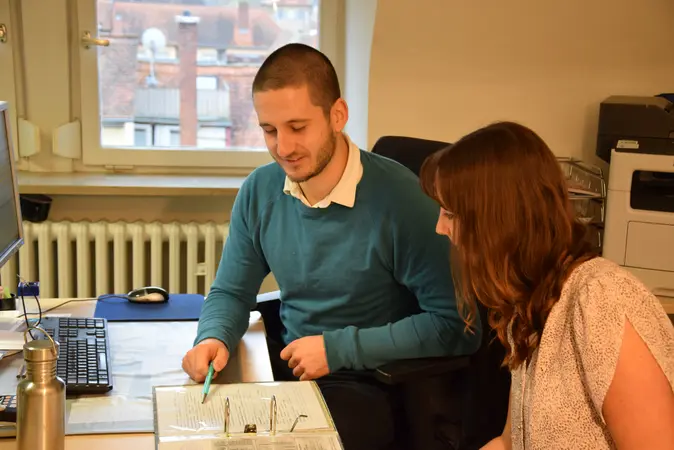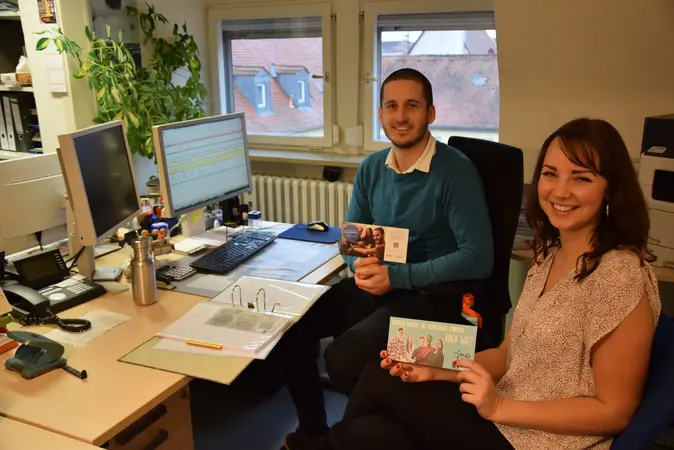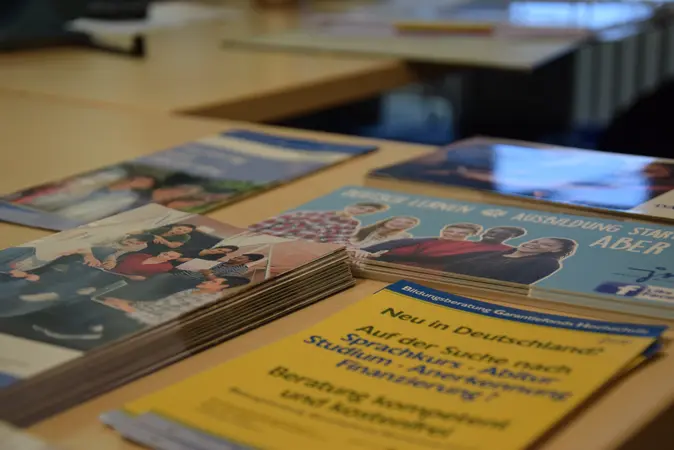Andreas Vogl turns over his duties as refugee coordinator to his successor Anna-Lena Denzler.
As the new contact person for displaced persons and refugees, Anna-Lena Denzler will provide a range of advisory services.
A wide range of informational materials is available in the refugee coordination office.
Language Skills for Successful Studies
Interest in the pursuit of a German university degree is quite high among refugees and displaced people, and one important prerequisite for a successful application is proficiency in the German language. The University of Bamberg’s International Office staff now includes a refugee coordinator who provides special advisory services and assistance pertaining to German language proficiency. From June 2017 to January 2018, Andreas Vogl, a master’s student in the Islamic Studies programme, held the position. His successor, Anna-Lena Denzler, took over in February. Denzler is currently working on her bachelor’s degree in Islamic Studies and through the end of 2018 she’ll provide advice and assistance to refugees seeking university admission. Both she and Andreas Vogl have drawn motivation from their prior experience as volunteers in refugee aid organisations. “I’ve been working with displaced people in my home town for quite some time, and now I can also apply the theoretical and linguistic knowledge from my studies to my work here at the university,” says Anna-Lena Denzler.
Assistance through personal consultation
In her role as refugee coordinator, Ms Denzler will not only be arranging language courses for those in need, but she will first be offering personal consultation in order to check that applicants possess the required qualifications for university admission. Thanks to his knowledge of Arabic, her predecessor Andreas Vogl was able to closely review applicants’ certificates and CVs and provide advice on things like acquiring or making up for lacking qualifications. The communication was even easier than expected: “When I started the job, I expected that my Arabic would also prove useful in consultation appointments, but by and large, the prospective students’ language skills were already so good that we were able to converse in German,” explains Vogl.
German courses in high demand
For many years, the University of Bamberg has offered two German language courses for international applicants, but due to increased demand, an additional, free course was added in the 2016/17 winter semester with funding from the German Academic Exchange Service (DAAD). All three of these courses geared towards both refugees and all prospective international students who don’t yet possess the language proficiency required for university studies in Germany. However, in the 2017/18 winter semester, displaced persons and refugees represented the largest proportion of the 50 course participants: a total of 18 people from Syria, Iran, Azerbaijan, Ethiopia, Armenia and Iraq began preparation courses for the required DSH proficiency exam. The most strongly represented refugee group is from Syria, and this group was second only to China in terms of the total number of international students preparing for the required level of German proficiency this semester.
Language exam as application qualification
Every applicant with a university entry qualification that fulfils the German requirements is first required to verify his or her German proficiency by way of a language examination. Based on individual skill levels, the university Language Centre arranges for applicants to attend a corresponding language course. One-semester courses ranging from the B2 to the C1 levels are offered, and as soon as a prospective student has attained the C1 level of the Common European Framework of Reference, nothing stands in their way of applying for university admission. When asked about the German courses, Moyad Dawod, an Iraqi who already has a master’s degree in engineering from his home country and would now like to attain the C1 level in German in order to continue his studies here, says, “The German courses at the university are really good, because they’re tailored specifically to our needs. I’m certain that these language skills will not only help me in my studies, but also in my subsequent professional life.”
Additional advisory services from the International Office
Beginning in the 2018 summer semester, the B2 level of language proficiency will be sufficient for admission to university studies. The language courses not only provide qualifications for studies at the University of Bamberg, but also throughout Germany. In Bamberg however, refugee participants must be registered residents of the city of Bamberg or the immediate region. At the end of the 2018 funding period, the demand for refugee language courses will be reassessed, but regardless of the findings, the two regular courses for international applicants will be continued as before. Following their successful completion of the language courses, Anna-Lena Denzler refers participants to her colleagues at the university’s International Office for continuing support throughout their studies at the University of Bamberg.
This news was translated by Benjamin Wilson.


